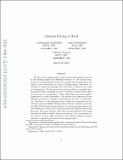| dc.contributor.author | Deckelbaum, Alan | |
| dc.contributor.author | Tzamos, Christos | |
| dc.contributor.author | Daskalakis, Konstantinos | |
| dc.date.accessioned | 2015-11-20T16:47:07Z | |
| dc.date.available | 2015-11-20T16:47:07Z | |
| dc.date.issued | 2012 | |
| dc.identifier.isbn | 978-3-642-35310-9 | |
| dc.identifier.isbn | 978-3-642-35311-6 | |
| dc.identifier.issn | 0302-9743 | |
| dc.identifier.issn | 1611-3349 | |
| dc.identifier.uri | http://hdl.handle.net/1721.1/99956 | |
| dc.description.abstract | We show that computing the revenue-optimal deterministic auction in unit-demand single-buyer Bayesian settings, i.e. the optimal item-pricing, is computationally hard even in single-item settings where the buyer’s value distribution is a sum of independently distributed attributes, or multi-item settings where the buyer’s values for the items are independent. We also show that it is intractable to optimally price the grand bundle of multiple items for an additive bidder whose values for the items are independent. These difficulties stem from implicit definitions of a value distribution. We provide three instances of how different properties of implicit distributions can lead to intractability: the first is a #P-hardness proof, while the remaining two are reductions from the SQRT-SUM problem of Garey, Graham, and Johnson [14]. While simple pricing schemes can oftentimes approximate the best scheme in revenue, they can have drastically different underlying structure. We argue therefore that either the specification of the input distribution must be highly restricted in format, or it is necessary for the goal to be mere approximation to the optimal scheme’s revenue instead of computing properties of the scheme itself. | en_US |
| dc.description.sponsorship | Microsoft Research (Fellowship) | en_US |
| dc.description.sponsorship | Alfred P. Sloan Foundation (Fellowship) | en_US |
| dc.description.sponsorship | National Science Foundation (U.S.) (CAREER Award CCF-0953960) | en_US |
| dc.description.sponsorship | National Science Foundation (U.S.) (Award CCF-1101491) | en_US |
| dc.description.sponsorship | Hertz Foundation (Daniel Stroock Fellowship) | en_US |
| dc.language.iso | en_US | |
| dc.publisher | Springer-Verlag | en_US |
| dc.relation.isversionof | http://dx.doi.org/10.1007/978-3-642-35311-6_22 | en_US |
| dc.rights | Creative Commons Attribution-Noncommercial-Share Alike | en_US |
| dc.rights.uri | http://creativecommons.org/licenses/by-nc-sa/4.0/ | en_US |
| dc.source | arXiv | en_US |
| dc.title | Optimal Pricing Is Hard | en_US |
| dc.type | Article | en_US |
| dc.identifier.citation | Daskalakis, Constantinos, Alan Deckelbaum, and Christos Tzamos. “Optimal Pricing Is Hard.” Internet and Network Economics (2012): 298–308. | en_US |
| dc.contributor.department | Massachusetts Institute of Technology. Computer Science and Artificial Intelligence Laboratory | en_US |
| dc.contributor.department | Massachusetts Institute of Technology. Department of Electrical Engineering and Computer Science | en_US |
| dc.contributor.department | Massachusetts Institute of Technology. Department of Mathematics | en_US |
| dc.contributor.mitauthor | Daskalakis, Konstantinos | en_US |
| dc.contributor.mitauthor | Deckelbaum, Alan | en_US |
| dc.contributor.mitauthor | Tzamos, Christos | en_US |
| dc.relation.journal | Internet and Network Economics | en_US |
| dc.eprint.version | Author's final manuscript | en_US |
| dc.type.uri | http://purl.org/eprint/type/ConferencePaper | en_US |
| eprint.status | http://purl.org/eprint/status/NonPeerReviewed | en_US |
| dspace.orderedauthors | Daskalakis, Constantinos; Deckelbaum, Alan; Tzamos, Christos | en_US |
| dc.identifier.orcid | https://orcid.org/0000-0002-7560-5069 | |
| dc.identifier.orcid | https://orcid.org/0000-0002-5451-0490 | |
| mit.license | OPEN_ACCESS_POLICY | en_US |
| mit.metadata.status | Complete | |
